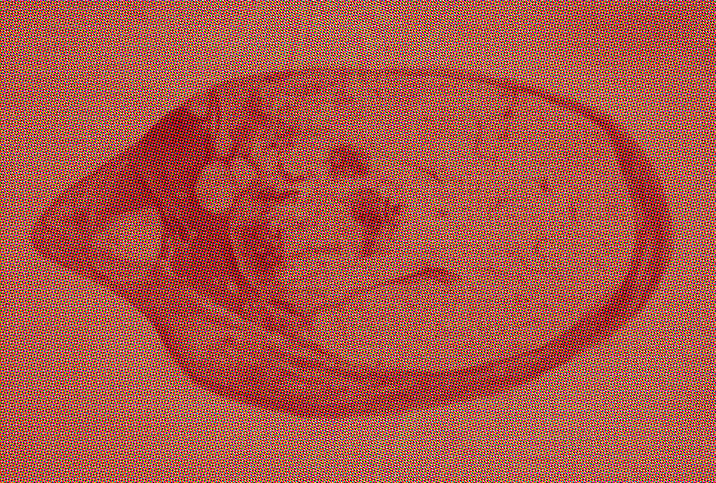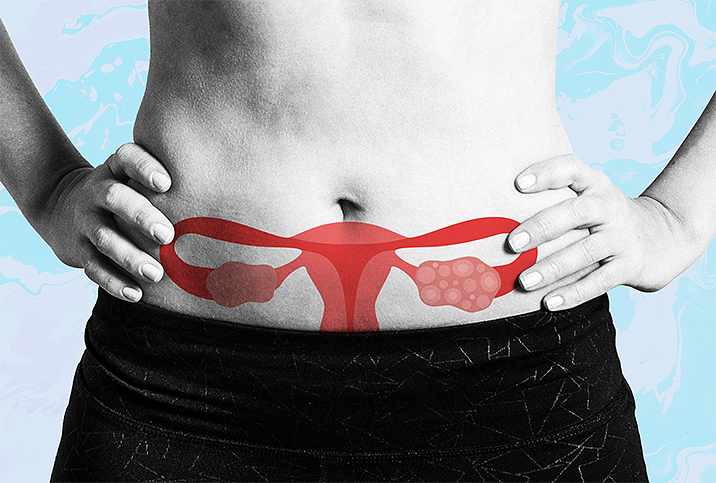Hailey Bieber Has an Ovarian Cyst 'the Size of an Apple'

Hailey Bieber wants you to know: No, she's not pregnant. The model-turned-entrepreneur does, however, have another important update to share about her health.
"I have a cyst on my ovary the size of an apple," Bieber wrote Nov. 28 on her Instagram story. "I don't have endometriosis or PCOS [polycystic ovary syndrome], but I have gotten an ovarian cyst a few times and it's never fun. It's painful and achey and makes me feel nauseous and bloated and crampy and emotional."
The 26-year-old included a mirror selfie of her stomach with a slight bulge, writing "not a baby" to underscore her nonpregnant status.
In the post, Bieber directly addressed fans who are also dealing with ovarian cysts.
"I'm sure a lot of you can overly relate and understand. We got this!" she wrote.
Bieber is likely correct to presume that many of her followers can relate. While endometriosis affects around 11 percent of women of reproductive age in the United States and PCOS affects between 6 percent and 12 percent, ovarian cysts are more common, occurring in 8 percent to 18 percent of people with ovaries in the U.S.
"I was impressed that [Bieber] was going public with this, discussing this and demystifying a thing that for many women can cause a lot of stress," said David B. Agus, M.D., a professor of medicine and engineering at the University of Southern California Keck School of Medicine, speaking with CBS News.
What is an ovarian cyst?
An ovarian cyst is a fluid-filled sac, similar to a blister, that develops on or inside the ovary. Most cysts are small and harmless, only growing to the size of a grape. However, larger cysts—such as Bieber's—can cause the belly to swell and form "ovarian cyst bloat."
Other symptoms of ovarian cysts include pelvic pain, pelvic pressure and bloating, according to Kecia Gaither, M.D., M.P.H., who is board-certified in OB-GYN and maternal-fetal medicine and the director of perinatal services/maternal-fetal medicine at NYC Health + Hospitals/Lincoln in the Bronx in New York City.
Less common symptoms include difficulty or overly frequent urinating, vaginal bleeding, and pain during sex or periods.
Most ovarian cysts resolve themselves without medical treatment. However, some can grow too large and require laparoscopic surgery to drain, remove and test the tissue for malignancy.
"See a physician if you experience sudden, severe abdominal or pelvic pain, fever, vomiting, fainting or weakness," Gaither said.
The different types of ovarian cysts
There are several different types of ovarian cysts, each occurring in different ways for different reasons. Causes of cysts can range from healthy menstruation to endometriosis to cancer, Gaither said.
The different kinds of cysts and their causes include:
Follicle cysts. One of the most common types of cysts, follicle cysts develop when a follicle of the ovary does not break open to release the egg. These cysts are related to the menstrual cycle and considered "functional" or normal, Gaither said. Follicle cysts do not usually cause significant symptoms.
Corpus luteum cyst. If the follicle does break open and free the egg, it can still develop into a cyst. The follicle typically dissolves into the corpus luteum; if it doesn't dissolve and instead reseals, the accumulation of fluid can become a corpus luteum cyst. Like follicle cysts, corpus luteum cysts are considered functional. These cysts may bleed and cause pain, but usually resolve themselves.
Hemorrhagic cysts. These types of cysts occur when a normal ovarian cyst ruptures a blood vessel during ovulation and blood collects within the cyst. Hemorrhagic cysts can become enlarged and painful and sometimes rupture, though many of them self-resolve.
Dermoid cysts. Ovarian dermoid cysts—also known as teratomas—occur when tissue collects under the skin, and may contain hair, teeth or other tissue. Most dermoid cysts are harmless, though a small percentage can be cancerous.
Endometriomas. Often called "chocolate cysts," ovarian endometriomas are cysts filled with menstrual blood. They can cause pelvic pain, particularly during periods and sex.
Tubo-ovarian abscesses. Typically forming because of an infection in the fallopian tube and ovary, tubo-ovarian abscesses can cause pain, fever and nausea. Treatment for these cysts typically includes antibiotics.
Agus recommended anyone concerned about the possibility of an ovarian cyst speak to their medical provider, but to "be aware that it's very common and most of the time it will resolve," he told CBS News.
If you don't have a regular healthcare provider, telehealth provides a way to start a relationship with a professional. Physicians everywhere have added video visits to their practices. Giddy telehealth makes it easy to get connected to a qualified healthcare professional who can help with a variety of conditions. Many of them offer same-day consultations at affordable rates.


















